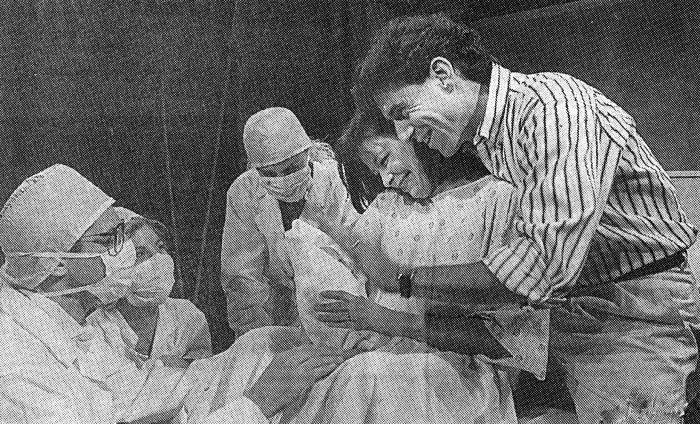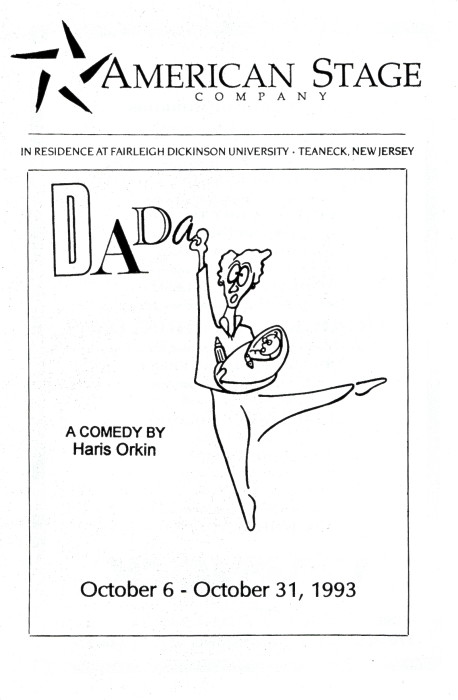Publicity
Full review
New York Times, Alvin Klein – The Anxieties of Childbirth in ‘Da Da’. “You’re still not sure, are you?” Karen asks David as he times her contractions in the delivery room while maneuvering ice cubes and sourballs, the familiar aids for fumbling fathers-to-be who were trained in the Lamaze method of natural childbirth.
Now, a playwright can structure a play any way he wants as long as the play works. When the play does not work, as “Da Da” at the American Stage Company does not, one tends to disbelieve its premise and question its raison d’etre. Given the play’s instant accessibility and identifiable associations, “Da Da” is an easy candidate for audience approval. Too easy. The playwright Haris Orkin’s writing is bland and overstated. It’s no big deal to chart the destination of “Da Da,” and it gets there with no surprises. But the playwright’s most damaging flaw is an inability to validate his premise. There is something askew about turning one of life’s most heightened moment-to-moment experiences, one demanding alertness and action and allowing for no distraction, into a device for rumination, soul-searching and, finally, resolution. In case of fire, flood or medical emergency, who wastes time looking for reasons and analyzing fears? You do what you have to do; then you ponder. Labor pains represent a task-oriented situation if ever there was one. A point of the Lamaze method is that a man is helpful and sharing. He avoids the stereotypically anxious pacing and agonizing outside. So here is David agonizing inside, bringing the neurotic, defining angst of his existence right into the delivery room, and presumably getting over it. Mr. Orkin’s play means to be as much about the birth of a father as the delivery of a baby, the contrived stuff a television sketch is made of. No sooner does David knock over a pitcher than his father and then his father — a double generational load of putdowns, disapproval and guilt — materialize. That means everything is coming up fumbling for this newest of fathers, who in his recollections is spilling Ovaltine (“I’m sorry, Daddy”) and being reprimanded. David also recalls his and Karen’s reasonable doubts about bringing a child into a crime-ridden, polluted planet. He acts out fantasies and relives memories, before concluding that he’d rather play Scrabble with Karen than play around with a bimbo who’s a perfect 10. Since all this is hardly seamless or particularly stageworthy, it is to the considerable credit of Joseph Megel, the director, that “Da Da” plays more fluidly than it is written, and it’s a blessed thing that David Breitbarth (David) gets beyond the role’s built-in stereotypical whining. The actor is engaging at simulating bewilderment, be it that of a reluctant bar mitzvah boy, an apprehensive prospective father or simply a receiver of mixed messages. (Karen: “It’s O.K. to be afraid”; David’s father: “There’s nothing to be afraid of.”) Julia Glander is a lively, many-colored Karen. Michael Marcus and Russell Leib are entrapped by stock characters. One is grandfather; the other, David’s father and David’s child. Mr. Orkin’s knack for underlining the obvious is as predictable as his talent for saying it. A bedridden grandfather’s request to David is interepreted to mean pull the plug. But the man is asking him to change the television channel. Once a gratuitous laugh is won, the line is repeated. For what? T. Ryder Smith is deft, all the way through, as James Bond (yes, James Bond, David’s escapist, no-strings role model), a rabbi, a minister, a judge, a coach and a therapist schooled in psychobabble. Suzanne Toren plays a mother and a prostitute. More interesting than Mr. Orkin’s strained message about the links in life is the fact that “Da Da” represents a link between two of the state’s theaters, having evolved from a workshop production by the Playwrights Theater of New Jersey in Madison a year ago. Such collaborations between theaters ought to be encouraged with the hope of better plays ahead. At best, the state of “Da Da” remains expectant. 10.17.93
[previous] [next]

